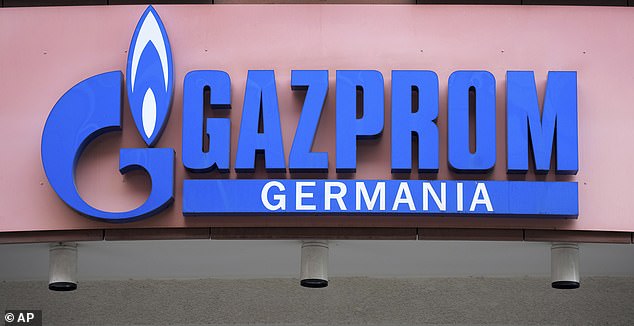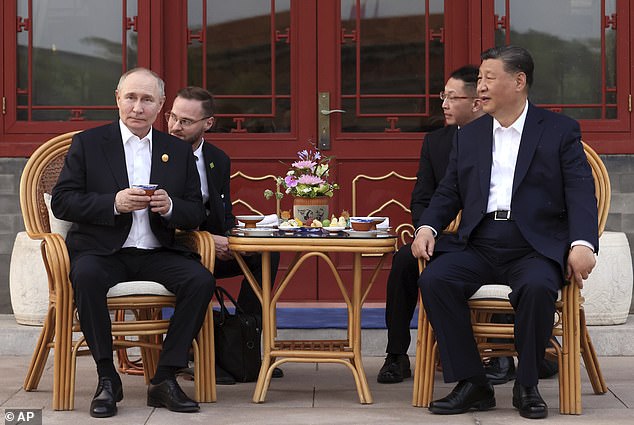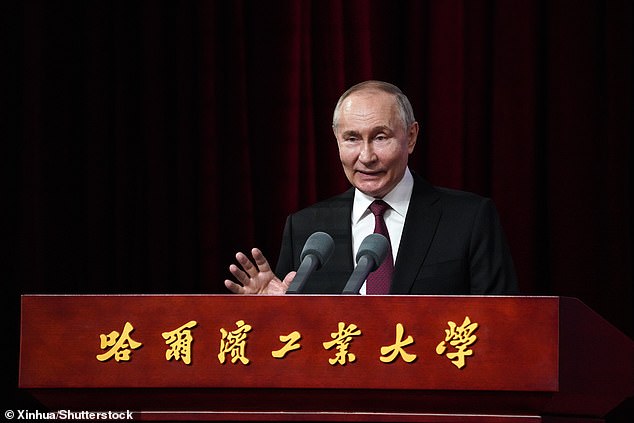The seismic shift in global power no one’s noticed – Russia is becoming China’s vassal state
In May 2014, two months after Russia invaded Crimea, energy giant Gazprom signed a £309 billion contract – the largest in its history – to supply gas to China.
Over the next five years, Gazprom built a gigantic pipeline, the Power Of Siberia, which could withstand temperatures as low as -62 degrees Celsius. This extraordinary feat of engineering wound 3,000 kilometers through the Siberian wilderness, from the Arctic Circle to the Chinese border.
It was formally opened to much fanfare in December 2019 – and its nine “compressor stations” began pumping billions of cubic meters of gas south into China, while sending billions of dollars in revenue north into the Kremlin’s coffers.
The pipeline symbolized the interconnected nature of these two very powerful autocracies.
In recent months, after the large-scale invasion of Ukraine in February 2022, Moscow hoped to sign a new agreement with Beijing, this time for an even longer pipeline: the Power of Siberia 2.
China and Russia both want a “multipolar world” in which the Americans are not in control and can invade weaker neighbors or invade their national waters without unpleasant consequences.

In May 2014, two months after Russia invaded Crimea, energy giant Gazprom signed a £309 billion contract – the largest in its history – to supply gas to China.
Since a series of mysterious explosions ruptured three of Russia’s four Nord Stream undersea gas pipelines to Germany in October 2022, Moscow has failed to find a market for the 146 billion cubic meters of gas it pumped annually to the EU.
Gazprom recently posted its first loss in more than two decades and its share price fell 5.5 percent.
But yesterday it emerged that Beijing is now playing hardball in negotiations over the alleged new link – making life difficult for Vladimir Putin.
The Chinese are trying to lower the price they pay for Russian gas and want to force their country to buy only a small part of the pipeline’s planned annual capacity. As a result, the deal has stalled.
Moscow is clearly seeking better terms – but Kremlin strategists would do well to remember the old Chinese proverb: “A person who waits for the roast duck to fly into his mouth must wait a very long time.”
The truth is that China largely has the upper hand, not just when it comes to the pipeline, but in every aspect of the relationship between these two countries.
Chinese leader Xi Jinping is a cunning old fox: he knows that, with an economy 800 percent larger than Russia’s, and a population ten times as large, he holds all the cards.
Russia is becoming increasingly isolated on the international stage due to its actions in Ukraine and is well on its way to becoming a puppet state of China.
After the summit between the two countries in Beijing last month, President Xi bid Vladimir Putin farewell with a warm hug: a gesture widely taken as a vivid illustration of their budding bromance.
But the pow-wow in the Chinese capital was not a meeting of equals.
In fact, the official Chinese account of the meeting did not even mention the new gas pipeline, while Putin himself was limited to announcing – rather sheepishly – that “mutual interest in its implementation has been confirmed.”

After the summit between the two countries in Beijing last month, President Xi bid farewell to Vladimir Putin with a warm hug: a gesture widely taken as a vivid illustration of their budding bromance

China sees Putin’s war as a useful litmus test for the West’s willingness to respond to a direct attack on the existing world order, writes Neil Barnett
But what about their mutual geopolitical interests?
More important than any pipeline deal, however, is the two states’ desire to bring about a shift in the global balance of power.
China and Russia both want a “multipolar world” in which the Americans are not in control and can invade weaker and smaller neighbors or invade their national waters without unpleasant consequences.
While China pays lip service to the West’s condemnation of Russia’s invasion of Ukraine, it actually views Putin’s war as a useful litmus test for the West’s willingness to respond to a direct attack on the existing world order.
As Russia’s economy is undermined by Western sanctions and its military loses thousands of troops a week in Ukraine, China is paying close attention, figuring out how, when and whether to take action against its country’s breakaway republic, Taiwan. southern coast.
Meanwhile, as Russia weakens, China only draws strength from its neighbor.
The messaging app Telegram, which the Moscow elite uses to gossip anonymously, is full of doubts about this situation.
What if, contrary to the Kremlin’s dark warnings about “UkroNazis” and “Nato aggression,” Ukraine and Western powers posed no real threat to Russia? What if the real strategic threat to Russia does not come from the West, but from the South?
Since China ceded large parts of Manchuria to Russia under the 1860 Beijing Convention – one of several treaties it signed in the 19th and early 20th centuries and which are now collectively known as the ‘unequal treaties’ – the country has been watching the country. it lost with ever-growing greed.
On Chinese maps, Vladivostok is still called by its original name, Haishenwai, and – as recently as 2020 – Chinese and Russian diplomats were locked in a row over Russians celebrating the 160th anniversary of the Sea of Japan port it had all those years ago acquired. .
China’s resentment is all the more evident because most of Russia’s natural resource wealth is in Siberia, the Russian province that swallowed up the former Outer Manchuria.
About eight million people live in this vast and desolate space – but the two Chinese provinces directly across the border together house more than 55 million people. Chinese is often heard in the far east of Russia.
Although Hong Kong and Macau were both returned to China (by Britain and Portugal respectively), the 1860 treaty is one of the few “unequal treaties” that have not expired or been renegotiated by China.
Now it could be Russia that starts to accept unequal treaties because China is talking about a barrel.
Since the start of the war in Ukraine, China has been Russia’s most valued trading partner.
In addition to supplying a wide range of industrial and consumer goods, Beijing has also bolstered its war machine by supplying crucial components such as machine tools and microelectronics.
In effect, Russia sells its sanctioned oil cheaply to China and then sends the money those sales generate back to China to pay for replacement of sanctioned goods.
A better definition of a ‘client state’ is hardly possible.
What does all this mean for the democratic world? Perhaps the most obvious point is that it is futile to suggest that China is the “real threat” and Russia is a “distraction.”
The reality is that Russia is becoming a proxy and a tool of China. Letting Russia have its way is like flashing a thousand green lights at China.
We can only hope that more and more of Russia’s 147 million citizens come to realize that NATO is not watching the steppe, and that the war in Ukraine is an unnecessary atrocity.
If they value their sovereignty and independence, endless wars and a voluntary capitulation are no way for China to keep them.
Neil Barnett is CEO of Istok Associates Limited, a private intelligence consultancy.
